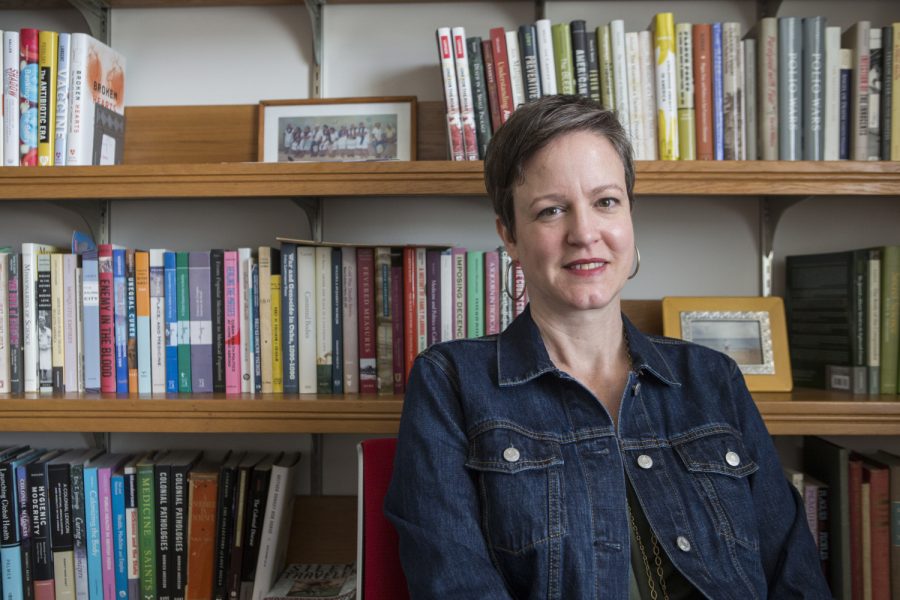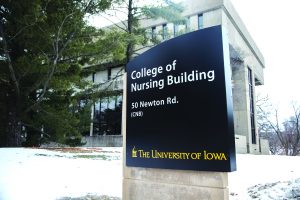University of Iowa associate professor considers Caribbean colonialism, yellow fever
UI faculty member Mariola Espinosa is conducting research for her second book about yellow fever in the Caribbean, studying what the colonial search for its cure could mean for cultural understanding.
Professor Mariola Espinosa poses for a portrait in her office in Shaeffer Hall on Friday, April 5, 2019.
April 16, 2019
As an undergraduate, a professor prompted Mariola Espinosa to write about Col. Bailey Ashford, an American physician in Puerto Rico who dedicated his life to curing illness in the country during the U.S. occupation. Espinosa felt a connection to the topic, because she was from Puerto Rico.
Now the University of Iowa director of Global Health Studies, Espinosa said that conversation eventually led her to write a book about illness a couple of islands over, in Cuba. Her latest publication, still in its developmental stages, will cover yellow fever in all of the Caribbean.
“I’ve been working on this for many years,” Espinosa said. “Seeing how different islands and different people in that region understood and dealt with a disease that afflicted many people there.”
Espinosa said her initial interest in yellow fever developed while reading narratives from U.S. authorities occupying Cuba who were obsessed with finding a cure for the disease. However, she found that mortuary rates showed the sickness didn’t even rank in the island’s top five killers.
RELATED: UI uses $1.6 million in grants to focus on humanities research
“It’s the kind of thing you dream of as a historian,” Espinosa said. “That you’ll go into the archives with an idea and then something pops up and is surprising.”
Although she originally thought her literary audience would be limited to Cuban historians, Espinosa said, the information could attract those studying medicine, colonialism, and the powers that intervene in other countries.
Unlike her first book, she said, this one will consider the Caribbean as a unit of islands, its inhabitants part of a larger community than linguistically distinct countries. In the age of empire, she said, illness such as yellow fever didn’t respect national boundaries.
“It was called a strangers’ disease, because it afflicted strangers to new locations,” Espinosa said. “The British, the French, and the Spanish were fighting in Europe, but when it comes to sharing knowledge, they were reading each other’s work.”
Life happens and can slow down an author, Espinosa said, but she hopes to see the book come together in the next three years. In the meantime, she travels to various archives and accesses medical treatises, military accounts of the tropics, among other resources online.
When Espinosa is not busy researching, she directs the Global Health Studies Program. The latter is 25 years old, but the major was created three years ago and continues to grow. Espinosa facilitates communication among faculty and students, among other duties.
“I think her leadership has allowed us to really fill a very important and overlooked need on this campus,” UI International Programs Associate Director Karmen Berger said. “We’ve created this area that students can come to academically and study social determinants of health.”
Espinosa said her understanding of people doing global health in the past will benefit the large proportion of students in the program who are driven by what they can do in the present. Berger agreed, saying Espinosa is poised to develop curricula as a historian.
“Her work really has looked at the complexity that health isn’t about going to the hospital per se,” Berger said. “It’s about things like racism, economic justice, and imperialism — and movements to fight those things and improve health equity through interrogating those systems of impression.”
Juggling the direction of an entire program and the research for an entire book is difficult, Espinosa said, and she looks for good mentorship to keep things balanced through people such as UI Professor Elizabeth Heineman.
“Her work for global health is huge,” Heineman said. “She’s just been amazing to work with because she’s doing this research to understand disease and health on a global scale.”






